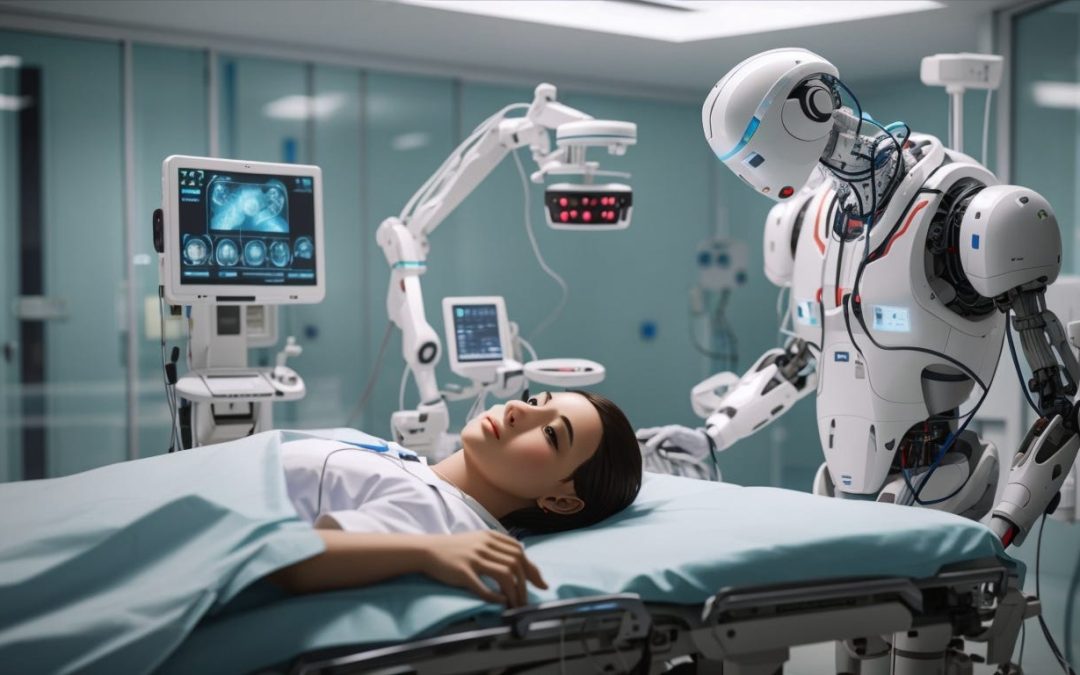Quick Guide
Use of AI in Healthcare
AI is being used in healthcare to improve patient outcomes, streamline administrative processes, and enhance communication between doctors and patients.
One example of AI in action is using data analysis to predict patient health risks and preventative measures. AI can also assist with medical imaging interpretation, such as detecting tumors or identifying heart abnormalities.
In hospitals, AI is being implemented to improve efficiency and productivity, such as automating appointment scheduling and record keeping.
Overall, the integration of AI in healthcare has the potential to greatly benefit both patients and healthcare professionals. However, it is important to consider the ethical implications and potential challenges that may arise with the widespread adoption of AI in healthcare.
How AI is used for data analysis and prediction of patient health risks
AI can analyze large amounts of patient data, including medical history, genetics, and current health markers, to predict potential health risks. This allows healthcare professionals to proactively address these risks and potentially prevent future illnesses and complications.
Some hospitals have even incorporated wearable technology, such as fitness trackers, into their analysis to gather more comprehensive data.
However, there are concerns about privacy and the accuracy of these predictive algorithms. In addition, healthcare professionals must be trained on how to properly interpret and act upon the findings from AI analysis.
Overall, while AI offers promising possibilities in predicting and preventing health risks, careful consideration must be taken to address any potential challenges.
Using AI for medical imaging interpretation
Another application of AI in healthcare is using AI for medical imaging interpretation. AI can assist with detecting tumors or identifying heart abnormalities in X-rays, MRIs, and other medical scans. This can potentially lead to earlier and more accurate diagnoses, improving patient outcomes. However, there are also concerns about the reliability and accuracy of these AI systems. Further research and testing is necessary to ensure that AI-assisted medical imaging interpretation can be effectively integrated into healthcare practices.
Using data analysis to predict patient health risks
Another application of AI in healthcare is using data analysis to predict patient health risks and inform preventative measures. By analyzing electronic medical records, lifestyle information, and genetic data, AI systems can identify potential health issues and recommend steps for prevention. This can potentially lead to better management of chronic conditions and improved overall health outcomes for patients. However, there are also ethical considerations, such as privacy concerns and bias in algorithms.
Streamlining administrative processes
AI can also be used to streamline administrative processes in healthcare. This includes automating scheduling and insurance claims, as well as managing patient records. AI systems can assist with tasks such as organizing and retrieving information, which can save time for healthcare professionals and improve efficiency. However, there are challenges related to implementing these technologies, such as the cost and ensuring proper security measures for sensitive patient information.
Enhancing communication between doctors and patients
AI can also enhance communication between doctors and patients, such as through virtual assistants or chatbots that provide medical advice and schedule appointments. These technologies can improve access to healthcare, especially in underserved areas. However, it is important to consider the limitations of these systems and ensure that they do not replace human interaction and personal care. In addition, steps must be taken to protect patient privacy and confidentiality in electronic communication.
Use of AI for medical imaging interpretation
Another example of AI in healthcare is its use for medical imaging interpretation. AI can assist with the detection of tumors or identifying heart abnormalities in X-rays, MRI scans, and other imaging tests. This can improve the accuracy and efficiency of diagnostic processes, potentially leading to better patient outcomes. However, there must be proper oversight and regulation to ensure the technology is used appropriately and ethically. Additionally, measures must be taken to protect patient privacy and confidentiality in the handling of their medical data.
Automation of administrative tasks in hospitals
Another application of AI in healthcare is the automation of administrative tasks. This can include managing electronic health records, scheduling appointments, and processing insurance claims. AI can help streamline these processes, saving time and improving overall efficiency in hospitals and clinics. However, care must be taken to ensure that the technology does not negatively impact job roles and employment opportunities.
Chatbots for communication and information access
Chatbots, powered by AI, can also assist with communication between doctors and patients. These virtual assistants can provide information on medication instructions and appointment reminders, as well as facilitate easy communication through secure messaging platforms. However, it is important to note that chatbots should not be solely relied upon for medical advice, as they are not a substitute for in-person consultations with healthcare professionals.
Overall, AI has the potential to greatly benefit the healthcare industry by improving patient outcomes and streamlining processes. However, careful implementation and consideration of ethical implications is necessary to ensure that it is used in an effective and responsible manner.
Chatbots for patient communication
AI-powered chatbots can also be used for communication with patients. These virtual assistants can assist with scheduling appointments, providing information about medications and treatment options, and even detecting symptoms to provide initial diagnoses. However, it is important that these chatbots are properly programmed and supervised by medical professionals to ensure accuracy and confidentiality of patient information.
In addition, AI can improve the efficiency of administrative tasks such as organizing medical records and billing. However, it is crucial that proper security measures are in place to protect sensitive patient data.
The benefits and potential challenges of incorporating AI in healthcare
The use of AI in healthcare has the potential to greatly improve patient outcomes and streamline processes. However, there are also concerns about privacy and the potential for AI to contribute to health care disparities. It is important that AI is implemented responsibly, with appropriate oversight and accountability measures in place. Additionally, steps must be taken to address any ethical considerations, such as the potential for AI to impact the doctor-patient relationship. Overall, incorporating AI in healthcare has the potential to bring about positive change, but it must be done carefully and thoughtfully.
The Future of Healthcare is Here: How AI is Transforming the Industry
As AI technology continues to advance, it is playing an increasingly important role in the healthcare industry. From assisting with medical diagnoses to streamlining administrative processes, AI is improving patient outcomes and efficiency within the healthcare system.
In the future, we can expect to see even more integration of AI in healthcare. This may include more personalized medicine, as AI can analyze an individual’s genetic makeup and medical history to predict potential health risks and guide treatment options. AI may also take on a larger role in telemedicine, allowing for remote patient monitoring and virtual consultations with doctors.
However, the integration of AI in healthcare must be done carefully and ethically. As with any technology, there are concerns about privacy and bias in decision-making. It will be important for healthcare professionals to continue educating themselves on the benefits and potential drawbacks of AI, and ensure that its use always puts patient well-being first.
Improving Outcomes and Efficiency: The Role of AI in Modern Healthcare
Another way that AI is being utilized in healthcare is to improve patient outcomes and streamline administrative processes.
For example, AI can analyze large amounts of data to identify patterns and predict potential medical issues for individual patients. This allows for early prevention and intervention, potentially improving overall health outcomes.
AI can also assist with administrative tasks, such as scheduling appointments and handling insurance claims. This can lead to a more efficient healthcare system, allowing doctors and other medical professionals to focus on providing quality care for their patients.
However, it is important to consider the potential drawbacks of using AI in healthcare. These include issues with privacy and security of patient data, as well as bias in algorithm development that may lead to unequal or unfair treatment of certain patients. It is crucial for healthcare providers to thoroughly assess the risks and benefits before implementing AI technology in their practice. Overall, the use of AI in healthcare shows promising potential to improve patient care and streamline processes, but it must be approached with caution and consideration.
A Doctor in Your Pocket: The Rise of AI-powered Virtual Health
The use of virtual healthcare, also known as telemedicine, has been on the rise in recent years. This trend is being propelled by advancements in AI technology, which allow for more efficient and personalized virtual appointments with doctors.
Some benefits of virtual healthcare include increased access to medical services for those in remote or underserved areas, improved communication between doctors and patients, and reduced wait times for appointments.
However, there are also concerns about privacy and security of sensitive medical information, as well as the need for proper training and guidelines for virtual healthcare providers. It is important to carefully consider the implications of AI in healthcare and ensure that it is being used ethically and effectively.
Final Words
In conclusion, AI is already having a significant impact on the healthcare industry. From predicting patient health risks to assisting with medical imaging interpretation, it has the potential to greatly improve patient outcomes and streamline processes. However, measures must be taken to ensure privacy and ethical use of AI in healthcare. As technology continues to advance, we can expect even more exciting developments in the field. The future of healthcare is indeed here, and AI is leading the way.


Recent Comments